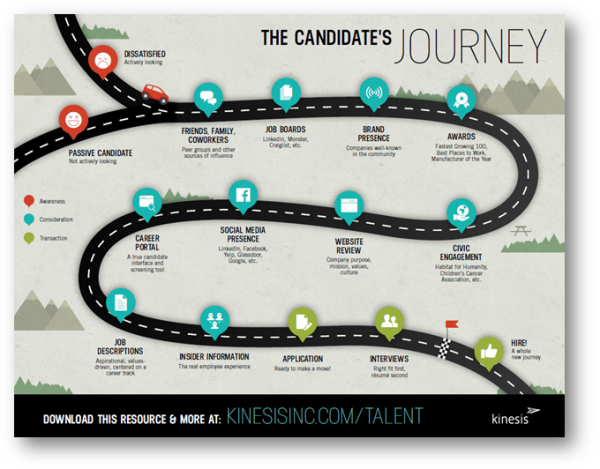
Courage and a Cup of Margin: A Case for Remarkability
Your Proprietary Way is the unique way you provide your services to clients — here’s why you need one.

At Kinesis, we're often asked about talent, recruitment, and the importance of marketing when it comes to building a great workplace - since we believe that HR and marketing are inherently related.
The fact is, employers today face a shrinking talent pool and a low unemployment rate (which means that there aren’t many people searching for positions). As a result, many companies are facing mounting recruitment challenges: Last year, 38% of employers reported experiencing difficulties filling job vacancies - a 2% increase since 2014. And this trend will only continue as more Baby Boomers reaching retirement age - with an astonishing 10,000 Baby Boomers retiring every day according to Pew Research.
Even the largest, most sophisticated companies – the ones flush with resources to invest in their recruitment and talent management strategies – report that attracting, developing and retaining top talent is among the most formidable challenges to achieving organizational growth.
“The ability to make good decisions regarding people represents one of the last reliable sources of competitive advantage, since very few organizations are very good at it.”
– Peter Drucker
Hiring and nurturing A-players the right way isn’t a matter of luck; it requires a recruiting and hiring process that consistently attracts great people whose skills and personalities align with your company’s core values and mission.
First, understand the realities of today’s hiring landscape:
Your ideal candidate probably already has a job. Let’s face it, on the whole high performers are much more likely to be gainfully employed. Particularly in the current low unemployment job market, A-players are not often out looking for jobs… and getting their attention means giving them an ironclad, surefire reason to leave a position in which they might very well be currently content.
“High performers are likely gainfully employed... which means you have to get their attention.”
To attract great people, you have to know what they're looking for. So what would draw an otherwise satisfied candidate toward your company? If you answered money, you’d be wrong. In his book Drive, Daniel Pink asserts that human need can be boiled down to three desires: mastery, autonomy, and purpose. Top talent wants interesting work that stimulates and challenges them. They want opportunities for career advancement within your organization with clear paths to promotions. And, they want to know that their daily activities are contributing towards a greater purpose (this is where your mission, values, and vision come in).
Attracting talent is marketing. Historically, finding new employees has been deemed an HR function… and finding new clients a marketing and sales function. But at Kinesis, we believe they are kissing cousins. Recruiting, hiring, onboarding, and retention are marketing activities that develop and nurture relationships with your candidates and employees… the same way you might think of marketing to develop and nurture relationships with prospective clients.
“Attracting talent is marketing... nurture relationships with candidates the same way you would with prospective clients.”

In marketing, we model a customer’s buying decision journey through three distinct phases: Awareness, Consideration, and Transaction. Each of these phases requires a different approach and messaging. And, believe it or not, the same methodology can be applied to potential talent:
Candidates – especially the best of the best – have changed the way they look for jobs. As we know, they are likely already employed and mostly content in their current position. Which means that in the early stage of their job search, the only reason that they will apply for an available position at your company is if you grab their attention.
And what do they want? Intriguing work, learning opportunities, some flexibility in their working environment, a bit of fun, and fantastic, passionate, engaged people as teammates.
Here are some strategies to capture talent in their “Awareness” phase of job search:
Ever read a job description that grabs you by the seat of your pants and makes you think, “My god… I want to be a part of this”?
No? In all likelihood, neither have your prospective employees. Well-written, compelling job descriptions are sometimes hard to find for candidates seeking fulfillment… which, fortunately for most small businesses, means that a well-worded employment opportunity could be a big differentiator.
The candidate will then begin a journey in which they ask their colleagues about you. They will review social media sites like Facebook, LinkedIn, and GlassDoor to get insight into your culture. They will go over your website with a fine-tooth comb and read your blog posts. And they will find some of your current employees from online profiles and invite them out to coffee to conduct an informational interview (aka: get the insider scoop).
In other words, your top candidates will be vetting you long before they apply for a position with your company. And once they go through their vetting process and decide your company is worthy of their attention – then (and only then) will they apply for the job that interests them.
The right talent is the single most important driver of your organizational performance. Hiring the best of the best will propel your organization to new heights… all you need is the right marketing strategy.
Ready to get strategic about your company’s employee recruitment and retention? Download the full Candidate’s Journey, or subscribe to the Kinesis newsletter for more useful tips!
Get insights like this straight to your inbox.